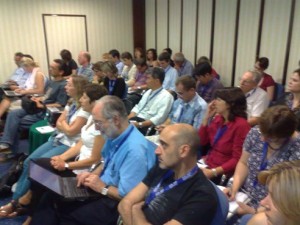Corfu, Greece – interactive discussion
The final part of the workshop was dedicated to an interactive discussion bringing to the table additional perspectives and an exchange of ideas on effective methods for DL interoperability and best practices for other related critical DL issues. The discussion also brought to light several open questions that should be further explored at similar events in the future.
There is nothing like a good debate to warm up an audience and this one certainly didn’t disappoint. Four key themes ran through this lively and fruitful discussion:
- Identifying commonalities with approaches to challenges in the arena of information systems coupled with pinpointing the specifics that define DL interoperability.
- Addressing mass digitization in the Reference Model.
- Closer collaboration between computer scientists and digital librarians.
- Fostering forward-thinking approaches in academic courses on information science and library services.
DL.org has begun to explore many aspects regarding DL interoperability, best practices and reference modelling across the six key concepts identified in the DELOS Reference Model.

Workshop Attendees 1
“Many of the problems are generic and related to other systems, so the approach has been to explore them at a higher level and then investigate the various facets that impact on the interoperability of DL systems, thus moving towards specific aspects. The Cookbook will need to be generic because users will make concrete implementations according to their individual needs.” Yannis Ioannidis, University of Athens.
(blogger note: DL Technology and Methodology Cookbook, one of DL.org’s planned outputs)
“Much of the work applies to any kind of information system. The specifics come into play when we apply concepts to a particular field.” Dagobert Soergel, University at Buffalo.
“The idea is produce for each scenario proposed solutions for interoperability, each with quality parameters.” Leonardo Candela, CNR-ISTI, on the role of the Cookbook.
“The framework will then define what interoperability is in terms of each of the six domains. The starting point is a generic model similar to other information systems but the goal is to map the framework to existing solutions“. Paolo Manghi, CNR-ISTI.
“It would be important to define the characteristics of DLs with regard to information systems on a concrete as opposed to abstract level. It is difficult to materialize concepts like functions and their roles if the approach remains on an abstract level. Hence it would be valuable to make it more explicit and ascertain the commonalities and differences with other information systems.” Tiziana Catarci, University of Rome, Member of the User WG.
“Variety is key. The aim is to avoid being too abstract as we risk losing significance in the real world but we also need to avoid being too low level as concrete examples may not apply across a broader spectrum. Adopting a middle ground approach enables users to adapt the framework to their specific cases. Users should be able to take the framework and customize it to their needs. The plan is to reach a point of stability in terms of the framework development.” Yannis Ioannidis, University of Athens.
